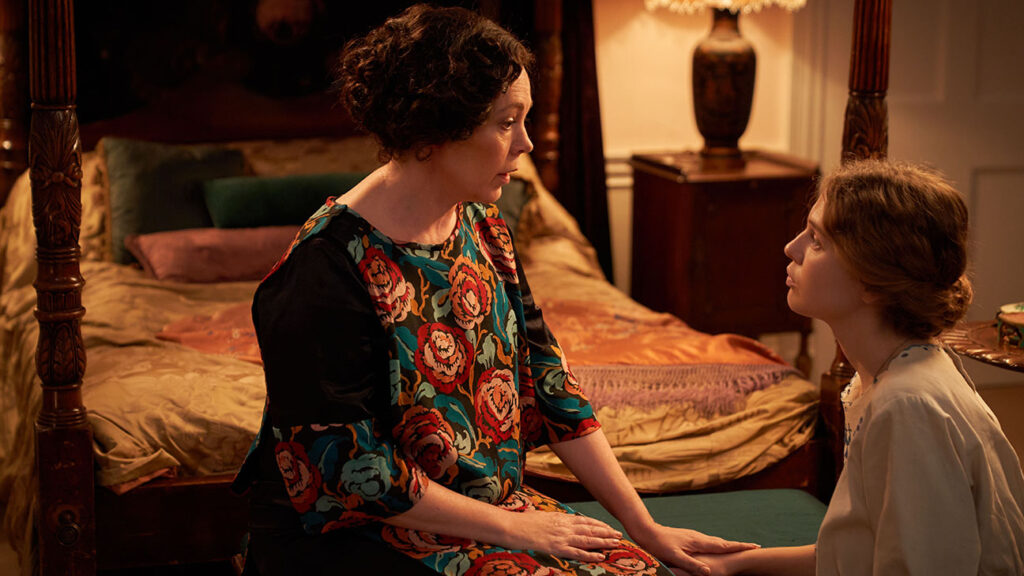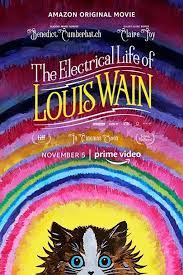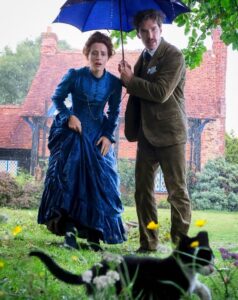The Electrical Life of Louis Wain | Directed by Will Sharpe | Written by Sharpe and Simon Stephenson | 111 min | Amazon Prime
Not that we needed any further confirmation, but Benedict Cumberbatch is really good at portraying eccentric real-life period Brits, from Alan Turing to Thomas Edison to Greville Wynne. It’s certainly not all he does — later this year he’ll also play an American in Jane Campion’s western, The Power of the Dog, and let’s not forget his mid-Atlantic vowel-sounds as Stephen Strange — but the anxious past is a groove he’s happy to return to.
In this film he’s another odd fellow — in these more enlightened times he might’ve earned clinical diagnoses — whose brilliant creativity made him famous, but it didn’t save him from hard times. It’s an unusual film — one part deeply art-directed Victorian romantic comedy with Wes Andersonian touches, one part tale of the struggle with mental illness, with added cats.
Wain (Cumberbatch) is an illustrator with a deep fascination with electricity, which he thinks of like The Force from Star Wars. As the primary breadwinner for his many sisters (including an entirely brittle Andrea Riseborough) and mother, he mostly works for a kind but gruff newspaperman (Toby Jones). That’s when he takes a shine to his younger sisters’ governess, Emily Richardson (Claire Foy), despite the scandal likely to erupt from a gentleman getting amorous with someone in service. He also becomes a national sensation with his illustrations of cats at a time when dogs were the preferred national pet.
With cameos from Taika Waititi and Nick Cave, and an English-as-Mary-Poppins voice over from Olivia Colman, there’s so much twee charm going on here — even including subtitles for the cats — that the artist’s tragic downturn later in life isn’t nearly enough to smother the picture’s irrepressible ebulliency.
Mothering Sunday | Directed by Eva Husson | Written by Alice Birch, adapting a novel by Graham Swift | 110 min
Well, could two films be more different? I say that despite their telling stories with overlapping themes of creativity as an avenue out of hardship and grief, set in similar times and places.
Mothering Sunday is a lyrical, gorgeous, and deeply melancholy British drama. Jane Fairchild (an astonishing turn from Odessa Young) works in service for the Niven family (Colin Firth and, once again, Olivia Colman) who live in perpetual grief because their sons died in the First World War. Their friends, the Sheringhams, also lost their boys, but for Paul (Josh O’Connor), who was too young to fight. Paul is engaged to be married, but in the meantime is having an affair with Jane over at the Nivens.
Much of the film takes place on Mothers’ Day, when Paul is expected at a lunch with family and fiancé at Henley-On-Thames, but is instead home in bed with Jane.
What’s delightful here, right off the bat, is the film’s unselfconscious attitude towards sex and the human body. We live in such a prudish time, so to see a picture this frank about humans taking pleasure in each other is practically transgressive. Perhaps, as we witnessed with Céline Sciamma’s Portrait of a Lady on Fire, filmmakers who are women really are the best at this right now.
The heart of the picture is a scene of Jane walking naked in a Downton-sized mansion, through a library and kitchen, and the joy and power therein, especially given the era and her position in it. This is a powerful dose of what I’m talking about.
Those visceral moments are balanced against scenes of jagged sadness — almost all the other characters living with grief and resentment, moment to moment. The score — a mix of atmospheric strings and a percussive, Reichian piano by Morgan Kibby — is a big part of the seductive spell the film casts as it shifts from passion to desolation.
Birch, whose work on Lady Macbeth and Normal People has confirmed her as a storyteller interested in both sensual and emotional authenticity, is backed up by terrific skill from Husson. The film fragments the narrative with jumps both backward and forward in time, where we visit Jane and her future husband (Sope Dirisu), and again Jane much later in life (a cameo from the legendary Glenda Jackson).
The film is still sinking in as the curtain goes down on this year’s FIN Atlantic International Film Festival, but I feel confident Mothering Sunday will be counted amongst the year’s best films.














